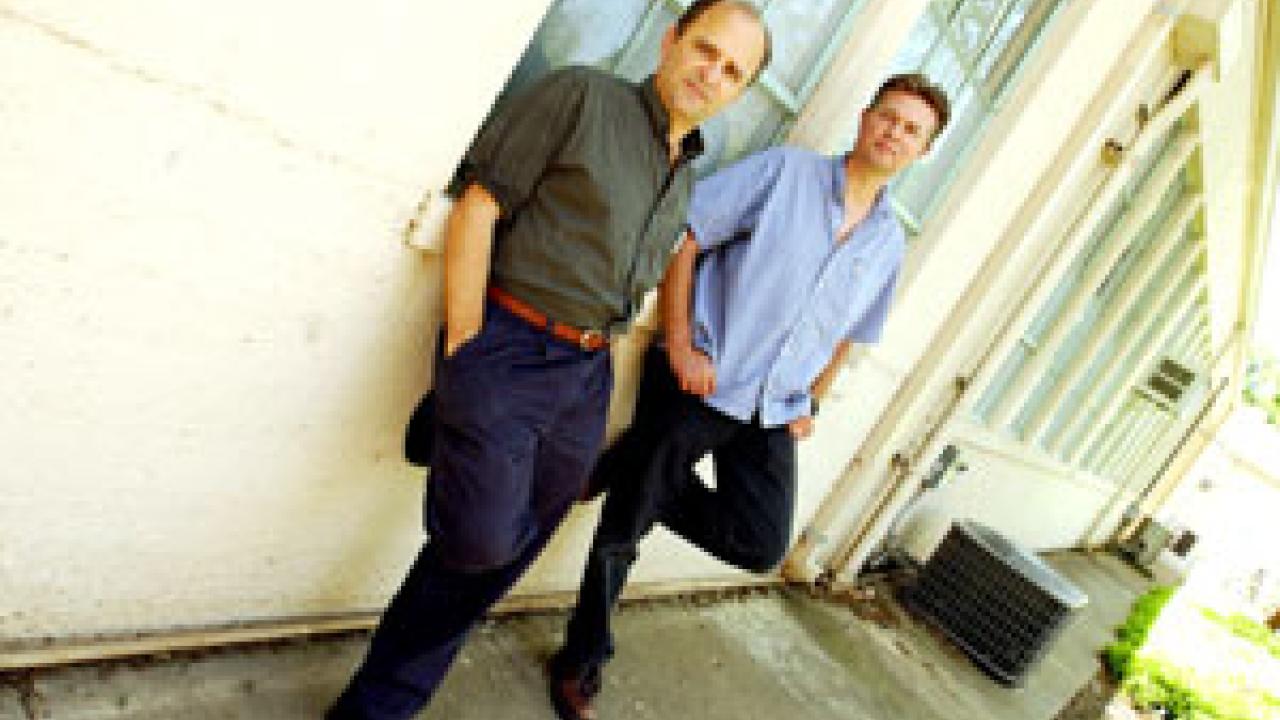Douglas Kahn and Jesse Drew are laboring away in a bare, scruffy Art Building office, constructing something rich and mysterious called "technocultural studies."
The pieces are almost together: a curriculum at the intersection of science, technology, the arts and humanities, and a series of technical classes; a $1.5 million plan to revamp the Art Annex into high-tech studios and a wireless laptop lounge; a schedule of academic workshops and seminars; and a vision of how "technocultural studies" can be made concrete.
Classes start winter quarter 2004, and the digital-age Art Annex should be up and running by that fall. As word of the program spreads, Kahn predicts that student demand will be high. But he wants to dispel any notion that this will be just another "gee whiz" program for those looking for bleeding-edge technical training.
"We plan to take a wider look at science and technology in the arts and culture -- not just at computers -- and at low technology, too, and how they all are sunk into everyday existence," says Kahn, program director for the venture who has spent much of his career bringing university art programs into the high-tech age, most recently at the University of Technology in Sydney, Australia.
"A lot of art and technology programs concentrate on the 'invention' -- the hopeful face of technology," Kahn says. "We also will take a critical look at the consequences for society and the environment of science, technology and the media."
Specifically, Kahn and Drew see their program including the interplay of technology and culture in the California Central Valley.
"I've lived in San Francisco for 25 years, but Central Valley culture is where I see the future of technology is happening," says Drew, who left a position as associate dean and head of the Center for Digital Media at the San Francisco Art Institute to be the associate director of the new program.
As an example, Drew points to the importance that modern agriculture plays in both technological advances and culture for the valley.
"Some think that digital technology deals with the Silicon Valley or Hollywood, and that it is naturally located in urban areas," Kahn adds.
"We want to look at technology as a lived relationship of how people respond creatively and responsibly to their environment."
The program will start with five core faculty members housed within the Division of Humanities, Arts and Cultural Studies. Drew's job will entail curriculum development, technical infrastructure design, research and teaching.
Technocultural studies, like most new programs at UC Davis, will be interdisciplinary, linking computer scientists with digital artists and nanoscientists with cultural theorists. Currently, Kahn is working with the College of Engineering to secure a joint appointment with the departments of Computer Science or Electrical and Computer Engineering. Other joint appointments are planned for the future.
Kahn says the arts and humanities have a major role in educating future leaders in creative fields where technology is involved, pointing to the problem highlighted recently by recruiters for a major California animation company. The recruiters said in the current job market they put a premium on creative, thoughtful thinkers among the plethora of technically adept animators.
"We want our students to be instilled with the self-motivation to create their own businesses, if necessary" Kahn says.
The goal of the major is to attract both students interested in fine and performing arts, literature and cultural studies, and those interested in the popular media.
To assure a common level of technical proficiency among the students, Drew and Kahn have assembled about a dozen one-unit skills classes within their curriculum.
Students will need to take a minimum of four classes in areas such as Photoshop, digital cinema production, multimedia on the Web, sound design and video Web installation. When they are up to speed technically, students will be ready to take on challenging upper-division assignments that emphasize making media.
Besides the introductory and "writing across the media" classes, the new program will offer emphases that include "edge cinema" (taught by art professor Lynn Hershman), the history of sound and technology (taught by Kahn) and theories of virtuality.
The Art Annex, located south of the Art Building, is being redesigned to include labs for 3-D model making; high-end digital work stations for editing videos; a large classroom; the wireless laptop lounge (coffee encouraged); and a black-box studio for recordings, performances and other public events.
The building currently houses Classroom Technology Services, a unit of Information and Educational Technology.
Kahn, who specializes in the cultural history of sound and technology in the arts, has master's degrees in art studio from Cal Arts and in music composition from Wesleyan University as well as a doctorate in art history and theory from University of Western Sydney. He wrote Noise, Water, Meat: A History of Sound in the Arts (1999) and co-edited Wireless Imagination: Sound, Radio and the Avant-garde (1992).
Drew combines practical-world experience with artistic and scholarly endeavors, having worked for a dozen years in the electronics industry for companies like Hewlitt-Packard and Dolby Laboratories, with an academic career. He holds a bachelor's degree in interdisciplinary arts and a master's degree in broadcasting and electronic communications, both from San Francisco State University; and a doctorate in radio, television and film from the University of Texas at Austin.
He also has taught for the past nine years as well as producing independent documentary and artistic video and multi-media work for the past 15 years.
Media Resources
Susanne Rockwell, Web and new media editor, (530) 752-2542, sgrockwell@ucdavis.edu
